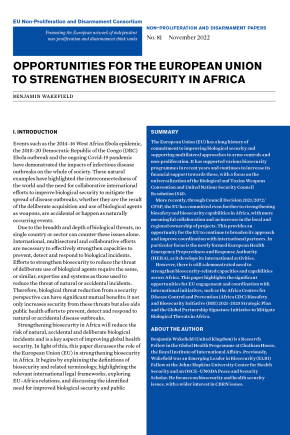Opportunities for the European Union to Strengthen Biosecurity in Africa
The European Union (EU) has a long history of commitment to improving biological security and supporting multilateral approaches to arms controls and non-proliferation. It has supported various biosecurity programmes in recent years and continues to increase its financial support towards these, with a focus on the universalization of the Biological and Toxins Weapons Convention and United Nations Security Council Resolution 1540.
More recently, through Council Decision 2021/2072/ CFSP, the EU has committed even further to strengthening biosafety and biosecurity capabilities in Africa, with more meaningful collaboration and an increase in the local and regional ownership of projects. This provides an opportunity for the EU to continue to broaden its approach and improve coordination with international partners. In particular focus is the newly formed European Health Emergency Preparedness and Response Authority (HERA), as it develops its international activities.
However, there is still a demonstrated need to strengthen biosecurity-related capacities and capabilities across Africa. This paper highlights the significant opportunities for EU engagement and coordination with international initiatives, such as the Africa Centres for Disease Control and Prevention (Africa CDC) Biosafety and Biosecurity Initiative (BBI) 2021–2025 Strategic Plan and the Global Partnership Signature Initiative to Mitigate Biological Threats in Africa.
I. Introduction
II. Background
III. EU commitments and relevant bodies
IV. EU activities to improve biosecurity in Africa
V. International efforts and opportunities for improved coordination
VI. Conclusions

